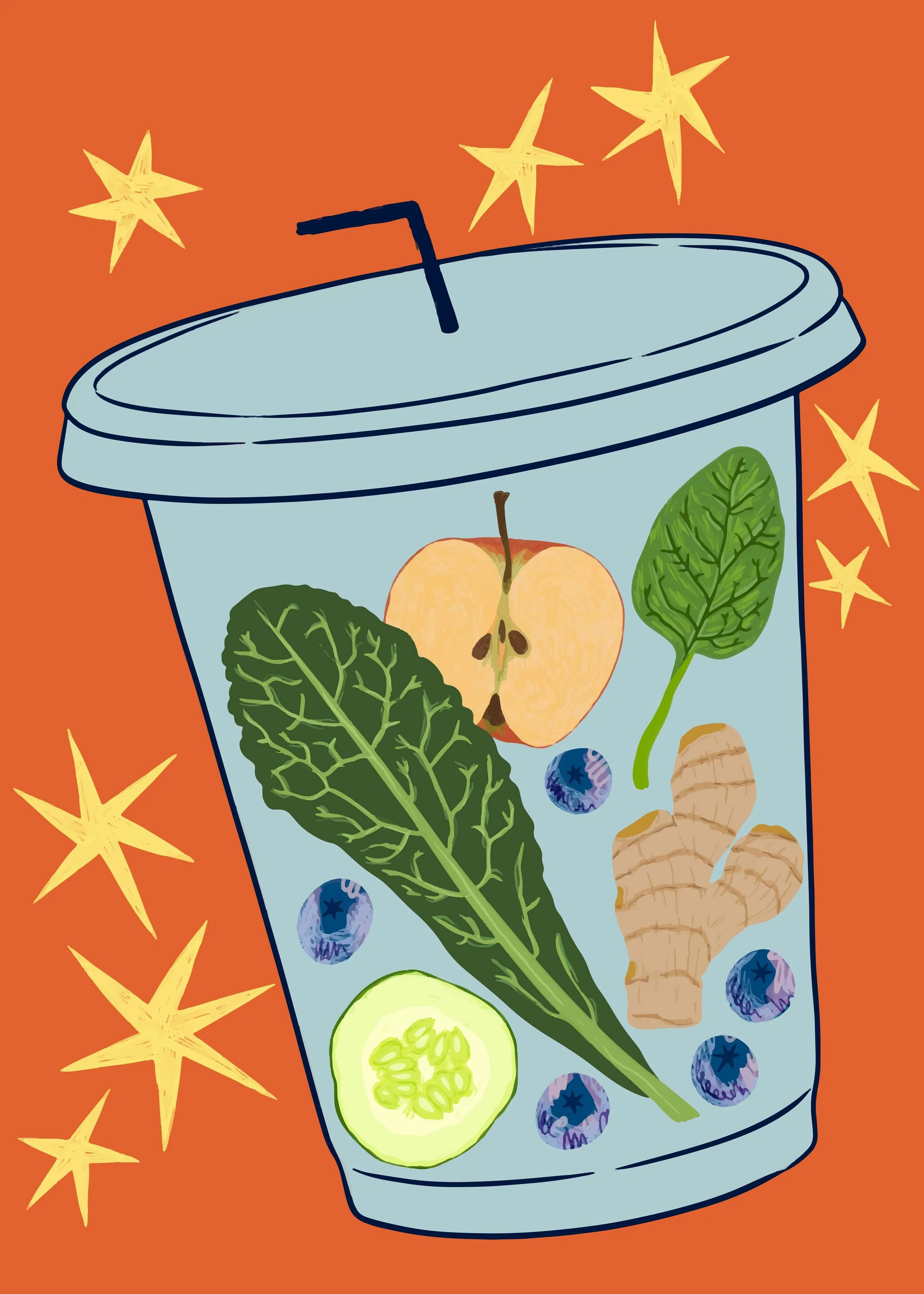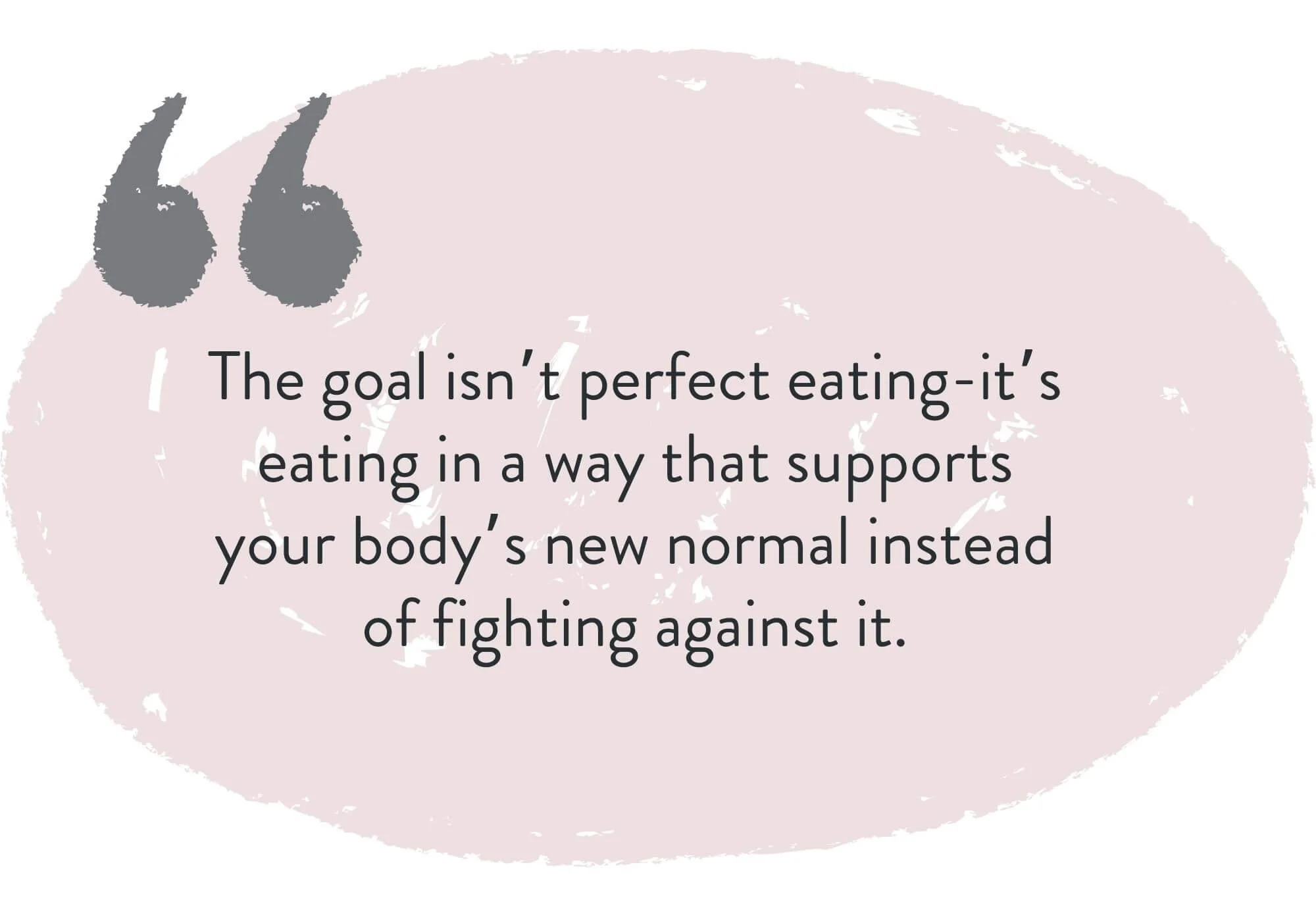Foods that Balance Hormones in Perimenopause
(This is the final post of a 3-part series focused on hormone health during perimenopause)
Part 1: What’s happening to my hormones?
Part 2: What “unbalanced” feels and looks like
Part 3: Foods & habits to balance hormones naturally
Besides sticking my head in my freezer, I never imagined that the cure to my hot flashes was in my kitchen.
In fact, your kitchen might be the most powerful pharmacy for hormone health you’ll find.
Wait! Before you roll your eyes and think “here comes another restrictive diet,” let me stop you right there. "
The right foods can actually help control perimenopausal symptoms.
This post isn’t about elimination or deprivation. It’s about addition, about adding foods that actually support your hormones instead of sending them into a complete meltdown.
Food as Hormone Medicine?
I’m not going to lie, for the past decade, I looked forward to my evening glass of wine as much as I looked forward to my birthday as a kid. Except now, the sweet nectar still tastes delicious, but the immediate hot flash that accompanies the wine lingers way after I’ve sipped the last sip.
My cherished afternoon cold brew that has always helped me finish the day strong? It now ensures that my cortisol levels will be sky-high, and it’ll be another hot, sleepless night.
Our changing hormones have literally changed how our bodies process food.
It’s not our fault, it’s biology. It happens to every single one of us. And ladies, if we had any clue that this was a thing, we would’ve been more prepared than a Girl Scout on a camping trip. Because once you understand the rules of the new game, you can work with your hormones instead of against them.
The Hormone-Food Connection
Every time you eat anything, you’re essentially sending text messages to your hormone squad (from part 1). The question is: Are you texting “all good, play on, player🧘🏽♀️” or “EMERGENCY! PANIC! SEND HELP” in all caps?
Eating the following foods consistently has kept my crew reassured that everything is stable (well, right now).
Hormone-Balancing “Superfoods”
Phytoestrogens
Flax Seeds
Ground flaxseed contains lignans that mimic estrogen and support estrogen balance. Flax seeds also are crazy rich in omegas for brain health.
*I sprinkle a handful of flax seeds into the batter of my breakfast muffins
Organic Soy
Organic tofu, tempeh, unsweetened soy milk and edamame contain isoflavones that gently act like estrogen in the body.
*I boil frozen edamame for 3 min, drain, then toss w/coarse salt and sesame oil
Sesame Seeds/Tahini
Tahini is basically sesame seed butter that contains lignans and unique compounds that help your liver process hormones more efficiently.
*I keep a jar of tahini in my fridge and drizzle it on everything, esp. apples
Hormone Stabilizers
Leafy Greens
Spinach, kale, and Swiss chard are packed with magnesium, so they are peacekeepers, calming your cortisol levels when you need it.
*I freeze fresh unopened bags of spinach to throw in with pasta dishes.
Avocados
Say what you want about millennials and avocado toast, these green ladies have all the healthy fats your body needs to produce hormones. The combo of fats, fiber, and the other bajillion nutrients keeps you fuller for longer as well.
*I ❤️ dairy-free Caprese salads (trade the cheese for avocado)
Salmon (wild-caught)
The omega-3 fatty acids are anti-inflammatory powerhouses that help reduce the systemic inflammation that makes all hormone symptoms worse. Aim for twice a week if possible.
*Super easy recipe: Avocado oil, s&p, cook in the air fryer 390° for 10 min. Yum.
Blood Sugar Balancers
Sweet Potatoes
Unlike regular potatoes that increase your blood sugar quickly, sweet potatoes provide steady, sustained energy.
*I dislike sweet potatoes so I juice mine daily, with lemon, oranges, ginger, etc.
Quinoa
Quinoa is a rare non-animal-based complete protein and helps keep your blood sugar and energy stable.
*I like tri-color quinoa in my DIY “Chipotle” chicken bowls instead of rice.
Nuts & Seeds
Pumpkin, sesame, and sunflower, along with other seeds, provide protein, healthy fats, plus zinc, magnesium, vitamin E, omega-3s, and so on.
*I sprinkle seeds with “everything but the bagel” seasoning for an afternoon snack
Stress Fighters: The Cortisol Tamers
Fatty Fish
Beyond salmon, sardines and mackerel are omega-3 powerhouses that help reduce inflammation and support brain health. Yes, they're an acquired taste, but your brain will reward you.
*Omg, sardines packed in olive oil on salted crackers with salt and pepper!
Dark Chocolate
The real stuff (70% cacao or higher) contains compounds that can help reduce cortisol levels. It's literally medicine that tastes like dessert.
*Handfuls of dark chocolate dairy free chips perk my mood up a few times a day.
Herbal Teas
Passionflower and holy basil tea help activate your parasympathetic nervous system—basically telling your body it's safe to relax. Guava leaf tea has tons of benefits for peri. It’s great for stabilizing blood sugar, it’s full of antioxidants and eases digestion by boosting gut health
*I make organic guava leaf tea nightly, to sip and to use as a hair rinse.
Beyond Food:
Your Hormone Health Lifestyle Toolkit
*These are all relatively simple, everyday solutions that don’t require buying anything. However, as we all know, money can buy comfort, so if money isn’t a problem, the starred bullets are probably for you.
Sleep Hygiene
“Well-rested” becomes elusive in perimenopause.
Keep a consistent sleep schedule, even on weekends. Changing my sleep schedule was a struggle for me as I am a total night owl, but I can say that waking with the sun and sleeping before midnight has absolutely changed my physical and mental health.
Keep your room cool. Like, really cool. 60°-67°F (15-19°C) is the ideal range for deep sleep. Not sleepy? Try to take a warm shower 1-2 hours before bed, which helps drop your body’s temperature quickly, telling your brain that it’s bedtime.
I change my sheets often. Like every two days. And I love it. There is nothing like clean sheets for good sleep. I wash them all together once a week, so I’m not totally wasting water, but I have 3 sets.
*Linen and bamboo are your bffs! I bought a fancy set of sheets last year, and I don’t want to look back.
Stress Management
Find tiny pockets of calm in your day (without adding to your to-do list)
The 4-7-8 breathing trick is insane. Inhale through your nose for 4 counts, hold for 7 counts, and exhale forcefully for 8 counts. I do this 3 times in a row when I feel overwhelmed. It literally resets my nervous system in under 2 minutes.
Every morning after I shower and eat breakfast, but before I check my emails, I do a morning pages brain dump. 5 minutes with a timer. It’s like taking my mental trash out before I start my day.
My favorite! End your morning shower with a 30-second cold rinse. It lowers your cortisol and feels so energizing. Plus, it’s great for your hair. Our water doesn’t get very cold down here in the Virgin Islands, so I keep mason jars full in the fridge to dump on ourselves.
Movement That Doesn’t Suck
Your body needs movement, but it doesn’t need punishment.
Lifting weights is medicine at this point. Do it at least twice a week. You are fighting for your muscles, but all they want to do is retire. Heavy weights. Not the pink 10 lb weights that came free with your yoga mat.
Walking after meals is so freaking good for our perimenopausal bodies, but I am super lazy after I eat. So I found a guilty pleasure podcast that wasn’t about work or productivity, that I normally couldn’t justify listening to (Stassi)
Hear me out: no matter what the commitment is, normalize saying, “I have to check my calendar and I’ll get back to you.” Making this small change has been a game-changer in reducing my stress. It gives me time to make an educated and thoughtful (non-stressful) decision.
Other Habits for Hormone Health
Eat Protein at Every Meal
I aim for 20-30 g of protein at each meal to help stabilize blood sugar, sustain my energy, and curb cravings. Breakfast is the only meal that is slightly difficult, and that’s only because I am the pickiest eater.
Time Your Eating
My goal is to eat my largest meal of the day in the morning, but I am not quite there yet. However, I make sure to make a full plate with proteins and fruits, and have stopped eating my Eggos on the run. Baby steps, right?
Stay Hydrated
Dehydration makes both physical and mental perimenopausal symptoms worse. I make it a competition (with myself) to drink at least 8 glasses of water daily. My fridge is always fully stocked with an assortment of La Croix. Whatever it Takes!
The Reality Check:
What I Experienced
Confession, I am the queen of instant gratification.
That’s why it took my stubborn ass 2 years to work WITH my hormones and not against them consistently. I am saying this because you won’t feel amazing overnight. Overall, it took me about 6-8 weeks of consistent changes to notice fundamental differences, but it was like my dimmer switch was gradually turning up.
My energy has become more predictable.
My sleep has improved (significantly). The post-lunch crashes aren’t as dramatic. (I, however, still am)
And most importantly,
I am starting to feel like myself again—just a wee bit more knowledgeable.
Make It Sustainable
(Because Perfection Is Bullsh*t)
The goal isn’t to eat perfectly 100% of the time. The goal is to make choices that support your hormone health more often than not. Some days you’ll nail it. On other days, you’ll eat a loaf of bread in bed, and that’s okay too. (That’s me, I ate the loaf in bed last night.)
Progress, not perfection
Support, not restriction
Work with your body, not against it
What to do next:
Start small.
Pick one or two foods from this list and add them to your routine tomorrow.
Pay attention to how you feel.
Not just “good” or “bad”, listen to exactly what your body is telling you. Keep a simple wellness log for a few weeks. It was wild to see patterns between what I ate/drank and how my body and mind reacted.
Remember, this is a marathon, not a sprint.
Your body has been doing its thing for decades; you have to give it time to adjust to the new hormonal support you are providing.
Thoughts? Leave me a comment below 👇🏽
Also, let me know which new hormone-healthy habit you are going to try first this week?
I love hearing about small wins and real-life experiments. Because at the end of the day, we’re all just trying to figure out how to feel human again, so no gatekeeping allowed!
This is the end of my 3-part hormone health series, but I’ve got so much more to say about the importance of hormone balance in perimenopause. Later this season, I’m diving deep into cortisol management, since the worst symptom of peri is the stress that you get from all of the other symptoms!
Plus, I’ll be sharing more specific strategies, tips, and secrets for sleep, exercise, and supplements that have been working for me.
Have a hormone health question? Send me an email or drop it in the comments. Your questions become my content:)






